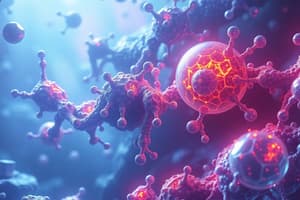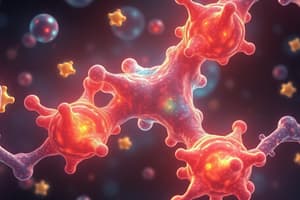Podcast
Questions and Answers
What is the primary role of enzymes in biochemical reactions?
What is the primary role of enzymes in biochemical reactions?
- To increase the activation energy required for reactions
- To permanently alter the chemical structure of substrates
- To act as catalysts that speed up reactions without being consumed (correct)
- To protect cells from chemical reactions
What determines the specificity of an enzyme for its substrate?
What determines the specificity of an enzyme for its substrate?
- The complementary shape of the active site to the substrate (correct)
- The concentration of the substrate
- The pH level of the solution
- The temperature of the environment
What happens to an enzyme when it is subjected to temperatures beyond its optimum?
What happens to an enzyme when it is subjected to temperatures beyond its optimum?
- It undergoes denaturation and loses its shape (correct)
- It becomes more effective at catalyzing reactions
- It can regain its shape and function
- It changes its active site to fit different substrates
What is formed when a substrate binds to an enzyme's active site?
What is formed when a substrate binds to an enzyme's active site?
Why are enzymes considered necessary for living organisms?
Why are enzymes considered necessary for living organisms?
What is true about the process of enzyme-catalyzed reactions?
What is true about the process of enzyme-catalyzed reactions?
What is the consequence of enzyme denaturation?
What is the consequence of enzyme denaturation?
Which of the following best describes the lock and key hypothesis?
Which of the following best describes the lock and key hypothesis?
What effect does magnesium deficiency have on the chlorophyll production in plants?
What effect does magnesium deficiency have on the chlorophyll production in plants?
Which statement correctly describes the role of nitrate ions in plant growth?
Which statement correctly describes the role of nitrate ions in plant growth?
What is the immediate visual indicator of magnesium deficiency in plants?
What is the immediate visual indicator of magnesium deficiency in plants?
How does the lack of nitrate ions specifically affect a plant's ability to grow?
How does the lack of nitrate ions specifically affect a plant's ability to grow?
What is the primary consequence of reduced photosynthesis due to magnesium deficiency in plants?
What is the primary consequence of reduced photosynthesis due to magnesium deficiency in plants?
What is the primary function of chlorophyll in photosynthesis?
What is the primary function of chlorophyll in photosynthesis?
Which leaf adaptation helps optimize carbon dioxide intake during photosynthesis?
Which leaf adaptation helps optimize carbon dioxide intake during photosynthesis?
What is the role of stomata in the leaf?
What is the role of stomata in the leaf?
During photosynthesis, which substance is released as a by-product?
During photosynthesis, which substance is released as a by-product?
What is the primary purpose of the cuticle in leaves?
What is the primary purpose of the cuticle in leaves?
Which layer of the leaf mainly carries out photosynthesis?
Which layer of the leaf mainly carries out photosynthesis?
What is the purpose of the vascular bundle in a plant leaf?
What is the purpose of the vascular bundle in a plant leaf?
Which statement best describes the function of guard cells?
Which statement best describes the function of guard cells?
What role does chlorophyll play in photosynthesis?
What role does chlorophyll play in photosynthesis?
How does increasing light intensity affect photosynthesis?
How does increasing light intensity affect photosynthesis?
What is a potential effect of insufficient carbon dioxide on photosynthesis?
What is a potential effect of insufficient carbon dioxide on photosynthesis?
Which of the following factors can restrict plant growth with respect to mineral deficiencies?
Which of the following factors can restrict plant growth with respect to mineral deficiencies?
In what form is sugar synthesized during photosynthesis primarily stored within plants?
In what form is sugar synthesized during photosynthesis primarily stored within plants?
What is the primary factor affecting the rate of photosynthesis in terms of temperature?
What is the primary factor affecting the rate of photosynthesis in terms of temperature?
Which gas exchange occurs through the stomata in leaves during photosynthesis?
Which gas exchange occurs through the stomata in leaves during photosynthesis?
What happens when nitrate ions are in short supply for a plant?
What happens when nitrate ions are in short supply for a plant?
How does an increase in carbon dioxide levels in greenhouses influence crop yields?
How does an increase in carbon dioxide levels in greenhouses influence crop yields?
What occurs during the compensation point in photosynthesis?
What occurs during the compensation point in photosynthesis?
What effect does water supply have on the photosynthesis process?
What effect does water supply have on the photosynthesis process?
Why are photosynthetic products essential for other parts of the plant?
Why are photosynthetic products essential for other parts of the plant?
Which condition must remain constant to optimize photosynthesis?
Which condition must remain constant to optimize photosynthesis?
Flashcards
Enzyme
Enzyme
A biological catalyst that speeds up chemical reactions in living organisms without being consumed.
Enzyme Specificity
Enzyme Specificity
Enzymes have a specific shape (active site) that fits only one particular substrate.
Active Site
Active Site
The part of an enzyme where the substrate binds and the reaction occurs.
Enzyme-Substrate Complex
Enzyme-Substrate Complex
Signup and view all the flashcards
Denaturation
Denaturation
Signup and view all the flashcards
Optimum Temperature
Optimum Temperature
Signup and view all the flashcards
Substrate
Substrate
Signup and view all the flashcards
Catalyst
Catalyst
Signup and view all the flashcards
Magnesium's Role
Magnesium's Role
Signup and view all the flashcards
Nitrate for Growth
Nitrate for Growth
Signup and view all the flashcards
Chlorosis
Chlorosis
Signup and view all the flashcards
Fertilizer's Impact
Fertilizer's Impact
Signup and view all the flashcards
Sugarcane and Nitrate
Sugarcane and Nitrate
Signup and view all the flashcards
Photosynthesis
Photosynthesis
Signup and view all the flashcards
Chlorophyll
Chlorophyll
Signup and view all the flashcards
Chloroplast
Chloroplast
Signup and view all the flashcards
Leaf Adaptations
Leaf Adaptations
Signup and view all the flashcards
Stomata
Stomata
Signup and view all the flashcards
Transpiration
Transpiration
Signup and view all the flashcards
Upper Epidermis
Upper Epidermis
Signup and view all the flashcards
Palisade Mesophyll
Palisade Mesophyll
Signup and view all the flashcards
Veins
Veins
Signup and view all the flashcards
Light Intensity
Light Intensity
Signup and view all the flashcards
Carbon Dioxide Concentration
Carbon Dioxide Concentration
Signup and view all the flashcards
Temperature
Temperature
Signup and view all the flashcards
Limiting Factor
Limiting Factor
Signup and view all the flashcards
Compensation Point
Compensation Point
Signup and view all the flashcards
Nitrate Ions (NO3-)
Nitrate Ions (NO3-)
Signup and view all the flashcards
Magnesium Ions (Mg2+)
Magnesium Ions (Mg2+)
Signup and view all the flashcards
Stunted Growth
Stunted Growth
Signup and view all the flashcards
Yellowing Leaves
Yellowing Leaves
Signup and view all the flashcards
Pale Green Leaves
Pale Green Leaves
Signup and view all the flashcards
Study Notes
Enzymes: Biological Catalysts
- Enzymes are proteins that act as biological catalysts.
- They speed up chemical reactions without being consumed or altered during the process.
- Essential for all living organisms, maintaining the reaction rates of metabolic processes.
- Without enzymes, digesting a meal could take weeks, rather than hours.
Enzyme Action and Specificity
- Enzymes are specific to particular substrates.
- Their active sites (where substrates bind) have complementary shapes to the substrates.
- This specificity is due to the 3D structure of the protein enzyme.
- The "lock and key" hypothesis describes this mechanism.
- Substrates enter the active site, forming an enzyme-substrate complex.
- Products leave the active site, allowing the enzyme to repeat the process.
Enzyme Action Mechanism
- Enzymes and substrates move randomly in solution.
- Collisions occur between enzymes and substrates with complementary shapes.
- The enzyme-substrate complex forms, facilitating the reaction.
- Products are released from the active site, leaving the unchanged enzyme available for more reactions.
Enzymes and Temperature
- Enzymes are proteins, and their shape is crucial for function, especially at the active site.
- Optimal temperature for human enzymes is 37°C.
- High temperatures break the bonds holding enzymes together, causing denaturation (loss of shape).
- Denatured enzymes cannot function because the active site's shape is lost.
- Denaturation is irreversible.
Studying That Suits You
Use AI to generate personalized quizzes and flashcards to suit your learning preferences.




